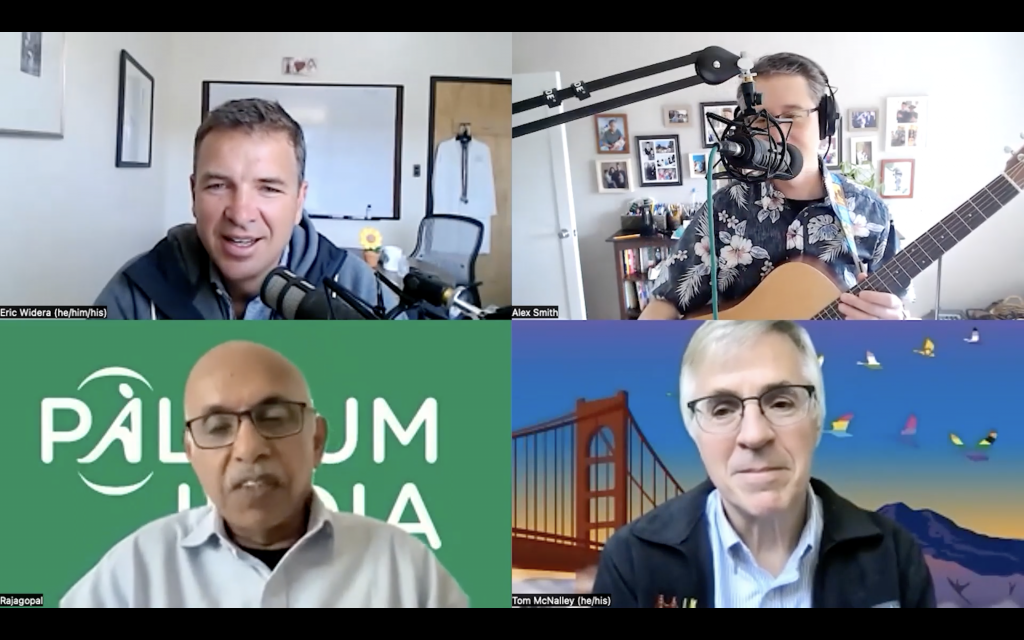World, focus on mitigation of suffering, or assist harm – Geripal podcast
Dr M.R. Rajagopal spoke on 12 May 2022 in GeriPal, a geriatrics and palliative care podcast in University of California San Francisco created to showcase the “brightest minds in geriatrics, hospice, and palliative care”.
He answered pertinent questions from hosts Eric Widera and Alex Smith, also joined by guest-host Tom McNally, a rehab and paediatric palliative care doctor. Alex is a palliative medicine physician-researcher and Professor of Medicine. Eric is a clinician-educator in the Division of Geriatrics at the University of California San Francisco.
The podcast is available with full transcript here: https://geripal.org/palliative-care-in-india-m-r-rajagopal/
Excerpts:
Hosts discussed with Dr. Rajagopal, one of the pioneers of palliative care in India about his recently published memoir ‘Walk with the Weary’.
Among them were early challenges Dr. Raj faced in accessing opioid, a system that didn’t see addressing suffering as a priority, loneliness, community-based palliative care, difference between chronic pain and palliative pain etc. Tom asked if there was a thunderclap moment which brought Dr Raj into palliative care.
Dr Raj narrated stories from his palliative care journey. One was about a 42-year-old college professor, whom he had helped with a nerve block in his early palliative care days. The focus was on the nerve, and the professor’s anxieties or fears were not addressed. The professor died by suicide that night; incurability had been conveyed to him like a bombshell – without preparation and support.
Eric asked about the big barriers the doctor faced back in 2002 in delivering palliative care, his struggles and lessons learned while trying to build up a new palliative care practice.
Dr Raj said it was the familiar resistance to change that became a hurdle. “We all go on in a certain path and taking a turn into the woods is threatening.” It’s so much more comfortable to go on doing whatever we have been doing, he said. The 61 million people globally, who are in serious health related suffering… they don’t have voice. So, we try to do as much as possible, attempt to change laws, change policies…
Tom: I remember the Pallium set up; a number of groups that go out in vans into the surrounding community to provide care for patients who are in their homes. It was very humbling to see the circumstances that people were trying to navigate, some with the spinal cord injury. I was really struck by the number of volunteers in the group.
Alex: I’m thinking in particular of one chapter in “Walk with the Weary’ called ‘No One Should Die Alone’. The chapter starts out, “When will you come next?” This is the mother who has an incurable cancer, whose daughter can’t visit her because she doesn’t have money for bus fare.
Raj: Loneliness is one of the most dreaded things for anyone. When I visit your hospices in the US, I see a lot of lonely people and I understand that there are also a lot of lonely elders living in the cottages outside the hospice. If only the system could organize community participation so that some lonely people outside after due training can spend some time with the lonely people inside. We tend to look too much at blood pressure, oxygen, saturation, and also nutrition, but no nutrition for the heart.
Tom: There is the program here in the US ‘No One Dies Alone’, where volunteers come and sit with people who are dying in the hospital. It’s a really wonderful way to make sure that folks are not lonely in those last moments of their lives. But it does beg the question: Why aren’t we thinking about that earlier? Does it have to be only at the end of life?
Raj: 90% of Indians do not have access even to basic pain relief, leave alone comprehensive pain relief, comprehensive palliative care. Less than 4% is the figure that we got, can be less than four, even one percent. We just don’t know, it’s bad.
Eric: I think it was the very last chapter or second to last chapter of your memoir, a quote from Don Berwick which ends with, “Either engage or assist the harm.” How can we engage?
Raj: Don Berwick said that if we remain silent, we assist the harm; we have to engage. Recognize that no human can be an island and that we are part of a community, the global community. I honestly believe that if we have a program which brings the community into healthcare, the community will find the answers – anywhere in the world.
Do listen to Pallium India’s theme song, “Walk with the weary”, rendered by Dr Alexander Smith, Palliative Medicine Physician-Researcher and Professor of Medicine, University of California, San Francisco.







